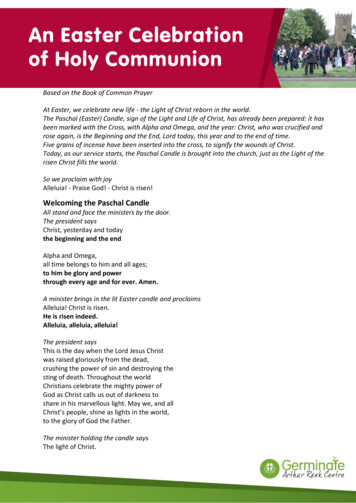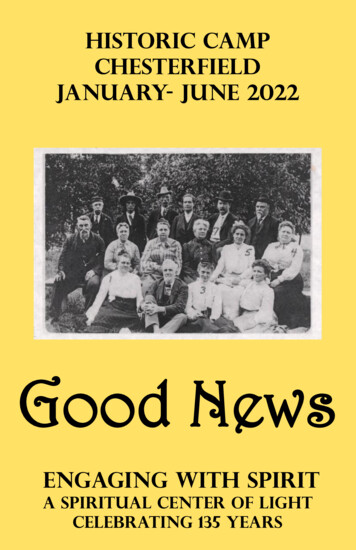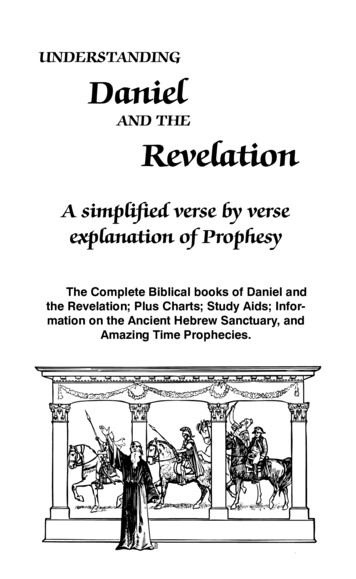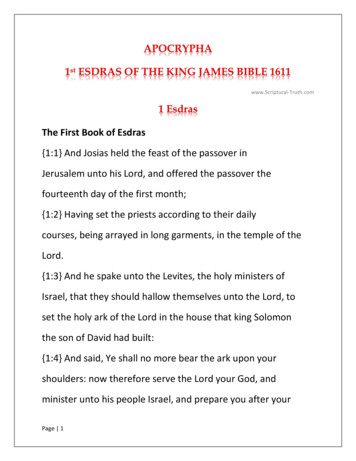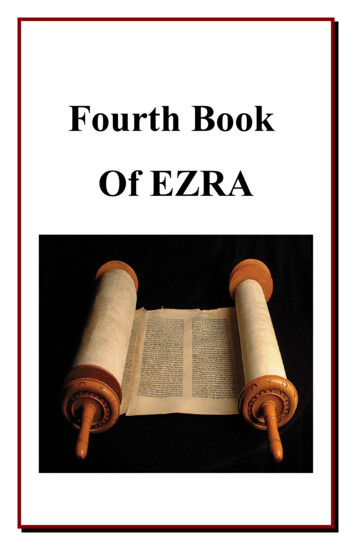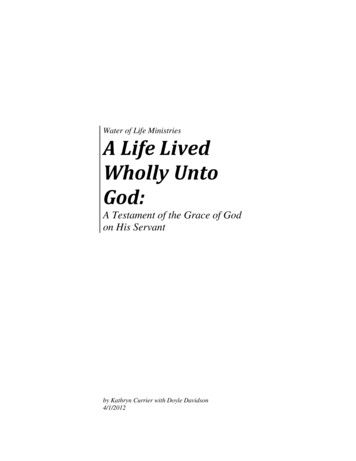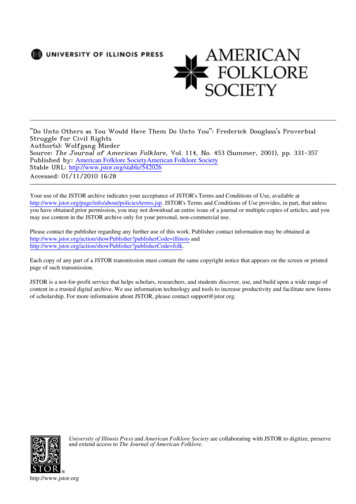
Transcription
"Do Unto Others as You Would Have Them Do Unto You": Frederick Douglass's ProverbialStruggle for Civil RightsAuthor(s): Wolfgang MiederSource: The Journal of American Folklore, Vol. 114, No. 453 (Summer, 2001), pp. 331-357Published by: American Folklore SocietyAmerican Folklore SocietyStable URL: http://www.jstor.org/stable/542026Accessed: 01/11/2010 16:28Your use of the JSTOR archive indicates your acceptance of JSTOR's Terms and Conditions of Use, available rms.jsp. JSTOR's Terms and Conditions of Use provides, in part, that unlessyou have obtained prior permission, you may not download an entire issue of a journal or multiple copies of articles, and youmay use content in the JSTOR archive only for your personal, non-commercial use.Please contact the publisher regarding any further use of this work. Publisher contact information may be obtained herCode illinois sherCode folk.Each copy of any part of a JSTOR transmission must contain the same copyright notice that appears on the screen or printedpage of such transmission.JSTOR is a not-for-profit service that helps scholars, researchers, and students discover, use, and build upon a wide range ofcontent in a trusted digital archive. We use information technology and tools to increase productivity and facilitate new formsof scholarship. For more information about JSTOR, please contact support@jstor.org.University of Illinois Press and American Folklore Society are collaborating with JSTOR to digitize, preserveand extend access to The Journal of American Folklore.http://www.jstor.org
WOLFGANGMIEDER"Do Unto Othersas You Would Have ThemDo Unto You":FrederickProverbialDouglass'sStrugglefor CivilRightsAs a deeplyreligiousperson,FrederickDouglass(1818-95) reliedheavilyon biblicalthe socialand moralstatementsin his debates,lectures,and writproverbsto strengthenings. But whilethe biblicalproverbsprovidedreligiousauthorityto Douglass'sdeliberahewasalsomuchawaretions,veryof thesocialsignificanceoffolkproverbsin hisfightand collectiveagainstslaveryandfor civilrights.Theproverbsfunctionas authoritativestatements,and they serveas importantsocialand moralmessages.As such,proverbsshow themselvesto be traditionalwisdomwellsuitedto becomingverbalweaponsin 95) was the most visible and influential African American of the 19th century. Together with Abraham Lincoln he belongs to a select group of truly outstanding public figures of that age. Son of a slave andan unidentified White man, Douglass escaped from slavery in 1838 after learning on hisown how to read and write. Lacking any formal education whatsoever, he neverthelessquickly became a driving force in the antislavery movement, impressing abolitionistaudiences with his oratorical eloquence and imposing presence. He subsequentlygained considerable fame both in the United States and in Great Britain as a vocal abolitionist, civil rights activist, and publisher of social reform journals. Nothing it seemscould stop this vigorous crusader from fighting for a better world where people of bothgenders and all races could live together in harmony. His autobiography Narrativeof theLife of FrederickDouglass, Writtenby Himself (1845; expanded twice in 1855 and 1893)became a classic in his lifetime, and the two sets of five massive volumes of The Life andWritings of FrederickDouglass (1950-75), edited by Philip S. Foner, and The FrederickDouglass Papers (1985-92), edited by John Blassingame, bear witness to his rhetoricalskills and moral courage.Frederick Douglass became one of the recognized voices speaking for many of theenslaved African Americans in the United States in the 19th century. He assumed theirnarrative identity, and when he spoke or wrote, his words were based on the authorityof the Bible and the democratic ideals of the United States. He fought his valiant battleTHEREISNO DepartmentandRussianatWolfgangMiederis Professorof Germanof Germanthe University of opyright? 2001, AmericanFolkloreSociety.
332Journalof AmericanFolklore114 (2001)againstslavery,not with the gun but with words before and duringthe Civil War anduntil the passing,in 1865, of the 13th Amendment outlawing slavery,and in 1870 ofthe 14th Amendment giving AfricanAmericansthe right to vote. But even afterthesevictories, he continued to raise his powerful voice for the causes of women's rights,variousminorities,temperance,free public education,and other social causes.He was asocial and political agitator in the best sense of that word, always arguing for thestrengthof morality,equality,and democracy.Douglass's rhetoricalprowess is legendary,but scholarshave hitherto ignored onemajor element of that oratoricalpower, namely his repeateduse of biblical and folkproverbsto add authoritativeand generationalwisdom to his arguments.For example,in the following list of rhetoricaldevices and techniques employed by Douglass, a direct referenceto proverbsis sorely names, denunciation, the rhetorical question, catachresis,anaphora,reductioad e1996:121]Three unpublishedtheses dealing explicitlywith Douglass'slanguageand style also ignore his propensityfor citing proverbs.They speakrathergenerallyof his use of "figurative language, illustration, and analogy" (Hale 1951:46), "literal and figurativeanalogies"(Hinshaw 1972:260), and "figuresof comparisonand contrastsuch as analogy, metaphor, and antithesis"(Kinney 1974:254). Even when on occasion a proverbmight be cited to illustratethe metaphoricalstyle of Douglass,both literaryand historical scholarsseem to miss the obvious fact that the greatoratoris very consciouslyintegratingproverbsinto his oral speech and autobiographical,epistolary,and journalisticwritings. William G. Allen, in a lecture on "Oratorsand Orations"delivered on 22June 1852 in New York, quite appropriatelyspoke of "Douglass [who] is not onlygreatin oratory,tongue-wise, but, consideringhis circumstancesin earlylife, still moremarvelousin composition, pen-wise" (Quarles1968:101).1SurelyAllen is not merelyspeakingof "wise"in the sense of "like"here but is also implyingwisdom as well. Andclearly he is proverb-wise as well, using proverbialwisdom wherever possible to advance his committed fight forjustice and liberty.In a lecture appropriatelytitled "The Decision of the Hour," delivered on 16 June1861, in Rochester, New York, Douglass has perhapsunwittinglyput forth his sociolinguisticmodus operandi:Men have their choice in this world. They can be angels, or they can be demons. In the apocalypticvision, John describes a war in heaven [Rev. 12:7-9]. You have only to strip that vision of its gorgeous Oriental drapery, divest it of its shining and celestial ornaments, clothe it in the simple andfamiliarlanguage of common sense, and you will have before you the eternal conflict between rightand wrong, good and evil, liberty and slavery, truth and falsehood, the glorious light of love, and theappalling darknessof human selfishnessand sin. [Blassingame1985-92:vol. 3, 437; Foner 1950-1975:vol. 3, 119]2
Mieder, Douglass'sProverbialStruggle333At leastto a degree, this "simpleand familiarlanguageof common sense"is what characterizesproverbs. As "monumenta humana," as the Finnish proverb scholar MattiKuusi has defined proverbs somewhat poetically, they contain the collected insightsand experiencesof people without representinga logical or universalsystemof philosophicalthought (Kuusi 1957:52). Instead,proverbsvery much reflectthe dichotomiesand contradictionsof life, as Douglass has describedthem in the cited passage.3Depending on the context in which they appear,they can take on differentfunctionsandmeanings,and they may serve good as well as evil designs.4Contraryto common belief, proverbsare anything but simple formulaicexpressions,and FrederickDouglass'suse of them is ample proof of their importanceas verbalstrategiesfor socialcommunication.5"If you give a niggeran inch, he will take an ell"FrederickDouglass is well aware of the ambivalentnature of proverbswhose wisdom can well be a double-edged sword. This becomes quite evident in his depiction ofhow slaveholdersemploy evil proverbsto justify the inhuman institutionof slavery.Astriking example is found in the very first paragraphof Douglass's earliestrecordedspeech of October 1841, addressingWhite abolitionistsin Lynn, Massachusetts:My friends, I have come to tell you something about slavery-what I knowof it, as I havefelt it. [.]I havesufferedunderthelashwithoutthepowerof itselfin my flesh.Andyet my master[Thomasof beingaAuld]hasthe reputationpious man and a good Christian. He was a classleader in the Methodist church. I have seen the piousclassleadercrossandtie thehandsof one of hisyoungfemaleslaves,andlashheron ersdo not hesitateto provefromtheBiblethatnot,shallbe beatenwithmanystripes."of the Gospeltell us thatwe werebornto be slaves.[Blassingameslaveryis right,andministers1985-92:vol.1, 3]Obviously, the vicious proverbialjustificationof slavebeatingis a willful misinterpretation of the gospel passagein Luke 12:13, where Christthe "Master"tells his "servants"that they should preparethemselvesand wait for their lord:But andif thatservantsayin hisheart,Mylorddelayethhiscoming;andshallbeginto beatthemenservantsandmaidens. theLordof thatservantwillcomein a daywhenhe lookethnotforhim,andat an hourwhenhe is not aware,andwillcuthimin s.nothimself,neither did according to his will, shall be beaten with many stripes. [Luke 12:46-47]The context makes it clear that the slaveholderis in fact the faithlessservantwho beatshis own people and who, as a consequence, will be beaten for failing to follow God'scommands. But that did not matter to the shrewd class of slaveholders.They simplytwisted part of the biblicalparableinto a precise utterance.The frequentverbaluse ofthis passage,as well as the actualphysicaland painfulperformanceof beatings,renderedit into a slaveholders'proverb that servedas a sagaciousformulato control the slaves.
334Journalof AmericanFolklore114 (2001)Douglass quotes this slaveryjustificationproverb numerous times in his speeches ofthe 1840s, and he certainlyrecalledit when writing his widely disseminatedNarrativeoftheLifeof FrederickDouglass,Writtenby HimselfI havesaidmy masterfoundreligioussanctionforhis cruelty.As an example,I willstateone ofmanyfactsgoingto provethischarge.I haveseenhimtie upa lameyoungwoman,andwhipherthewarmredbloodto drip;and,injustifiwitha heavycowskinuponhernakedshoulders,causingof Scripture-"Hethatknowethhismaster'scationof thebloodydeed,he ill,anddoethit not,shallbe beatenwithmanystripes."youngfouror fivehoursata time.I haveknownhimto tieherupwomantiedupin thishorridsituationleaveher,go to st;earlyin eragain,cuttingherin theplacesalreadyThis is a slightly more drasticrenderingof the terriblescene with its emphasison therunningblood. It is, of course, alwaysdisturbingwhen a religiousperson, as Douglass'smasterTom Auld claimedto be, would think he couldjustify his inhumanactsby misquoting the Bible. Worse demagogues,notablyAdolf Hitler, have done the same withbiblicalquotationsand proverbstryingto justify the killing of millions of people.7Of specialinterest is also an hitherto unrecordedproverb which expressesthe disregardfor the life of a slave as well as his murderedbody: "It was a common saying,evenamong little white boys, that it was worth a half-cent to kill a 'nigger,'and a half-centto bury one" (1845:32). In his second autobiographyMy Bondageand My Freedom(1855), Douglass explains this inhuman attitude furtherand calls it clearlya proverb,thus attestingto its widely held claim: "One of the commonest sayingsto which myearsearlybecame accustomed,on Col. Lloyd'splantationand elsewhere in Maryland,was, that it was 'worthbut halfa centto kill a nigger,and halfa centto buryhim;'and thefacts of my experience go far to justify the practicaltruth of this strangeproverb"(1855:204, 1893:516-517). In a short essaypublishedin August of 1863 in his journalDouglass'Monthly,he returnsonce againto this telling proverb,recallingits popularizedvalidity:"When a boy, on a slave plantationthe saying was common: 'Half a cent tokill a Negro and half a cent to bury him.'-The luxury of killing and buryingcould beenjoyed by the poorest members of Southern society, and no strong temptationwasrequiredto induce white men thus to kill and bury the black victims of their lust andcruelty"(Foner 1950-75:vol. 3, 369).There were, of course, many slaveswho survivedsuch pecuniarykillings,but in thatcase the slaveholderstried to kill the minds of their "chattels."But such mind controldid not alwayswork, for naturallyintelligentslavesoutwitted their masters,as Douglassexplainsthrough a fascinatingcontextualizationof a well-known proverb:Ignorance is a high virtue in a human chattel; and as the master studies to keep the slave ignorant,the slave is cunning enough to make the master think that he succeeds. The slave fully appreciatesthe saying, "where ignorance is bliss, 'tis folly to be wise." [1855:172]This formulation represents a fine example of Douglass's use of irony which easily turnsthe tables on the schemes of the slaveholders.8
ProverbialMieder,Douglass'sStruggle335And, to be sure, he knew from his own experience as a young boy what it meant tohave one's intellectual growth stunted. In 1826, at the age of eight, he was sent to Baltimore to live with Hugh and Sophia Auld and serve as a companion to their twoyear-old son Tommy. Things went very well at first, until Sophia Auld decided shewould teach young Frederick the alphabet. Her efforts were stopped almost immediately by her husband, but not before she had convinced the young boy of the importance of learning how to read and write.She very kindlycommencedto teachme the A, B, C. AfterI had learnedthis, she assistedme inlearningto spellwordsof threeor fourletters.Justat thispoint of my progress,Mr. Auldfoundoutwhat was going on, andat once forbadeMrs.Auld to instructme further,tellingher, amongotherthings,thatit wasunlawful,aswell as unsafe,to teacha slaveto read.To use his own words,further,he said,"Ifyou give a niggeran inch,he will takean ell. A niggershouldknow nothingbut to obeyhis master-to do as he is told to do. Learningwould spoilthe best niggerin the world.Now," hesaid,"if you teachthatnigger(speakingof myself)how to read,therewouldbe no keepinghim. Itwould foreverunfithim to be a slave.he would at once become unmanageable,and of no valuetohis master.As to himself,it could do him no good, but a greatdeal of harm.It would makehimdiscontentedand unhappy."[ .] Fromthatmoment,I understoodthe pathwayfrom slaverytofreedom.[ . ] Thoughconsciousof the difficultyof learningwithouta teacher,I set out with highhope, and a fixed purpose,at whatevercost of trouble,to learnhow to read.[1845:37,1855:217,1893:527]The "harm" of having been introduced to reading was already done, as Douglass statesby interpreting Mr. Auld's perversion of the 16th-century proverb "give him an inchand he'll take an ell" to his own advantage:Fromthis time I wasmostnarrowlywatched.If I was in a separateroom any considerablelengthoftime, I was sure to be suspectedof havinga book, and was at once calledto give an accountofmyself.All this, however,was too late. The firststep hadbeen taken.Mistress,in teachingme thealphabethadgiven me the inch,andno precautioncould preventme fromtakingthe ell. [1845:40,1855:223,1893:531]9His autodidactic education could no longer be stopped, and Douglass has narratedthe fact that he learned a great deal from studying the Bible and the primers of Whiteboys in the streets of Baltimore. And in 1830, at the mere age of twelve, he put hismeager savings to good use and bought himself a used copy of The Columbian Orator(1797), a popular collection of speeches and dialogues compiled by Caleb Bingham forthe purpose of rhetorical and moralistic instruction.'0 He read and reread passages fromthis book, memorizing many passages to draw upon in later life. Here he encounteredspeeches by such great orators as Cato, Cicero, George Washington, Benjamin Franklin, and William Pitt, and he was introduced to all aspects of human rights. Of specialinstructional use was a lengthy introductory essay on "General Directions for Speaking-Extracted from Various Authors," which provided Douglass with the rhetoricalskills for his later life as a public speaker." Very much to the point, Booker T. Washington in his biography of FrederickDouglass (1907) speaks of the fact that these texts"gave to young Douglass a larger idea of liberty than was included in his mere dream of
336Folklore114(2001)JournalofAmericanfreedom for himself, and in addition they increased his vocabulary of words andphrases"(1907:26). In fact, his deep rooting in the languageof the Bible, together withhis readingof such linguisticallysophisticatedexcerptsby greatminds, createda linguistic prowess in Douglassnot often encountered by earlyabolitionistaudienceswho listened to his eloquent speeches. While he was also influenced by the sermonic and attimes colloquial style of Black preachersand the rich traditionalsongs of the slaves,12Douglassrefrainedalmostcompletely from employing the dialectof the plantationandits quarters.In his late pamphlet Why Is theNegroLynched?(1894), Douglassmakes thetelling statementthat "when a black man's languageis quoted, in order to belittle anddegrade him, his ideas are often put in the most grotesque and unreadableEnglish,while the utterancesof Negro scholarsand authorsare ignored" (Foner 1950-75: vol.4, 507). Wanting to illustrateand prove that the intelligenceof Black people can matchthat of Whites, Douglass very consciously chose to employ standardEnglish andproved himself to be a masterat it.13Douglass'suse of proverbswas primarilydue to his interestin the Bible, as well as thesermonic style of Black preachers,a role that he himself took on duringmany Sundaymornings in church. Religious rhetoric has long been based on proverbiallanguage,using both biblical and folk proverbs to reach and educate the congregation.'4Theother reasonmight well be that he found them in that incrediblyinfluentialColumbianOratorwhich Douglass readso often that he knew many passagesby heart. In a threepage "Extractfrom the Eulogy on Dr. Franklin,Pronounced by the Abb6 Fauchet, inthe Name of the Commons of Paris,1790," he found, for example, the following highpraiseof proverbialwisdom: "The proverbsof 'Old Henry,' and 'Poor Richard,' are inthe hands of both the learnedand the ignorant;they contain the most sublime morality, reduced to popular language, and common comprehension;and form the catechism of happinessfor all mankind"(Bingham 1998:56). And in the "Extractfrom Mr.Pitt's Speech, in Answer to Lord Mansfield, on the Affair of Mr. Wilkes, 1770,"Douglass found the passageadheredlife;thatin everythroughMy lords,thereis oneplainmaxim,to whichI nwhichbymy liberty property concerned,questionof learntherefinementsamtodistrustthatIIof commonsense. confess,thedictatesaptmylords,andtoliableto deceivethemselves,menequallyI Binghammislead1998:145]In a speech on 26 March 1860, in Glasgow, Douglass mentions that "common sense,common justice, and sound rules of interpretationall drive us to the words of the lawfor the meaning of the law" (Blassingame1985-92:vol. 3, 349), and in an article on"Reconstruction"in AtlanticMonthly,December 1866, Douglassspeaksquite similarlyof "the plain, common-sense way of doing this work [of reconstruction]"(Foner1950-75:vol. 4, 203). Doubtlessly, "Douglassimpressedaudienceswith his sincerity,honesty,integrity,and common sense"(Hinshaw1972:212)during"hiswar with slaverythrough language"(Sekora1985:165).
ProverbialMieder, Douglass'sStruggle337"Thecrushedwormmayyet turnundertheheelof the oppressor"When Frederickagainstslavery,Douglassturnedto proverbsto makehisargumentshe could count on being understood by his audience. His use of folk proverbs in particular added a colloquial and metaphorical flavor to his arguments, and it is this figurative use of language that increased the general appeal of his serious messages. Whatfollows is but a small chronological selection of contextualized proverb examples, inwhich each proverbial message represents Douglass's typical "common sense" philosophy. He could at times be a bit long winded in his argumentation, and some of his sen-tences are clearlyrun-on constructions,but proverbshelp to focus or conclude suchdiatribes:Negro pewsin the church;Negro boxes in the theatre;Negro carson the railroad;Negro berthsinthe steamboat;Negro churchesand Negro schoolsin the community,are all perniciousfruit of r God-givencomplexion;and as suchstandintheofouranddirectlywayprogress equality.The axe mustbe laid at the root of the tree. Thiswhole systemof thingsis false,foul, andinfernal,andshouldreceiveour most , 72; 10 March1848]The timescreatetheirown watch-words;andthe watch-wordsof one generationmaynot alwaysbeto another.We would as willinglyfightthe battleof libertyandequalityunderthe banappropriatener of "FreeSonsandFreeMen,"as thatof the Declarationof AmericanIndependence."Deeds,notwords,"is ourmotto. [Foner1950-75:vol.5, 87-88; 1 September1848]The old proverb,"unitedwe stand,dividedwe fall,"hasbeen fullyand painfullyillustratedby ourantislaveryexperience,and it is quite time thatwe had learnedits lessonof wisdom.Moralenterprises,not less thanpoliticalandphysicalones, requireunion of feeling,union of aim, union of effort. Too long, we think,has thisimportanttruthbeen underestimated.Why shouldthe friendsofabolitionstandlongerdivided?Why shouldtheynot come together,anddo theirutmostto establishan abolitionorganizationuponwhich all mayhonorablystandandlabortogetherfor the extirpationof the commonevil of the country?[Foner1950-75:vol.2, 524-525;October1860]Happily,however,in standingup in theircauseI do, andyou do, but standin defenseof the causeofthe whole country.The circumstancesof this eventfulhour make the causeof the slavesand thecauseof the countryidentical.They mustfallandflourishtogether.A blow struckfor the freedomofthe slave,is equallya blow struckfor the safetyand welfareof the country.As Libertyand Unionhavebecomeidentical,so slaveryandtreasonhavebecomeone andinseparable.I shallnot arguethisIthasbeenmostAllseeallheartsfeelpoint.it; andall thatisalreadyablyargued. eyes it,begin toneededis the wisdomandthe manhoodto performthe solemndutypointedout by the sternlogicof our situation.It is now or never with us. [Blassingame1985-92:vol.3, 494; 5 February1862;Foner1950-75:vol.3, 215; 12 February1862]"Now or never"-that is indeed a proverbial slogan for the final military struggleagainst slavery during the Civil War. But as all of these references have shown,Douglass expresses his fears and hopes through proverbs, thus showing the humanity ofthis fight. Douglass is without doubt the agitator par excellence, calling things the wayhe sees them. And when he attacks the slaveholders of the South in ever new tirades,
338Folklore114 (2001)JournalofAmericanhe is even capable of a proverb sentence like "Honesty is the best policy even in dealing with slaveholders" to add a bit of biting satire to it all (Blassingame 1985-92:vol. 2,400; Foner 1950-75:vol. 5, 247; 14 October 1852).Even though he did not condone the idea of planning a militant uprising of theslaves, he uttered the serious warning that it might just come to this in an antislaverylecture delivered on 8 December 1850, in his hometown of Rochester. Here he integrates the 16th-century English proverb, "Tread on a worm and it will turn," in themiddle of his argument. The metaphor of the "worm" stands, of course, for the miserable life of the slave who has been reduced by the slaveholders to the lowest status ofanimallife:I wouldwarnthe Americanpeople,andthe Americangovernment,to be wise in theirdayandgeneration.I exhortthem to rememberthe historyof othernations;and I remindthem thatAmericacannotalwayssit "asa queen,"in anthishavebeen shatteredby the boltsof a just God;thatthe time maycome when thosetheynow despiseandhate,maybe needed;when thosewhom they now compelby oppressionto be enemies,maybewantedas friends.What hasbeen, may be again.Thereis a pointbeyondwhich humanendurancecannotgo. The crushedworm may yet turn underthe heel of the oppressor.I warn them, then,with all solemnity,and in the name of retributivejustice, to lookto theirways;for in an evil hour,those sablearmsthathave, for the lasttwo centuries,been engagedin cultivatingand adorningtheof terror,desolation,anddeath,throughfairfieldsof our country,may yet becomethe instruments1985-92:vol.2, 271; Foner1950-75:vol.2, 148-149]out ourborders.[BlassingameAnybody who experienced the civil rights marches and the serious struggles to keepthem peaceful under the leadership of Martin Luther King and others will be experiencing a dej vu here. This is a very precarious situation to which Douglass draws attention metaphorically and indirectly, but still clear enough for anybody to understand.Douglass noted well that his warnings and those of others were not necessarily beingheeded. Seven years later, on 11 May 1857, in New York City, he felt compelled todraw on the "worm"proverbagainto paint a very gloomy prophecy:The time may come when even the crushedworm may turn underthe tyrant'sfeet. Goadedbythecruelty,stungby a burningsenseof wrong,in an awfulmomentof depressionanddesperation,bondmanandbondwomanat the southmay rushto one wild and deadlystrugglefor freedom.Algo to bed with bowie knives,andapprehenddeathat theirdinners.Those ks,maywell expectto finddeathin theirdinner-pots.The worldis full of violenceandfraud,andit wouldbe strangeif the slave,the he contagion.He, too, maylearnto fightthe devilwith fire,and for one, I am in no frame of mind to pray that this may be long deferred.[Blassingame1985-92:vol.3, 169-170;Foner1950- 75:vol.2, 413]Douglass indicates in this speech that his pacifist attitude has been stretched to the limitand that the philosophy of nonviolence might not be workable much longer. Threeyears later, the Civil War broke out without the occurrence of a mass uprising of theslaves. But little wonder that Frederick Douglass and his sons became staunch supporters of the war effort, helping to recruit Black soldiers of the North to fight for the
ProverbialMieder,Douglass'sStruggle339struggle to liberate the "crushed worms" of the South who could finally "turn" andstand up for freedom and human dignity.Throughout his life's struggles, Douglass never gave up hope that the lot of the slavesand then freed African Americans would improve with time and effort. To argue thispoint, he often returned to biblical proverbs to strengthen his authoritative argumentthat slaveholders will, in due time, be punished for their evil deeds. Now, the slaveholders might not simply wind up in captivity themselves, they might also die (at leastfiguratively) by the proverbial sword for their crimes:The slaveholdersare sleepingon slumberingvolcanoes,if they did but know it; and I want everycoloredman in the South to remainthereand cry in the earsof the oppressors,"Libertyfor all orchainsfor all."I want them to staytherewith the understandingthatthe daymaycome-I do notitIdoInotthatwouldhastenII would advocatethe resultordonotthatwillcome,it,saysaysayaim to accomplishor bringit about,-but I say it maycome; and in so saying,I only basemyselfandupon humannature,and speakingout throughall history.upon the doctrineof the Scriptures,"Thosethatlead into captivityshallgo into captivity"[Rev. 13:10]."Thosethattakeup the swordshallperishby the sword"[Matt.26:52;Rev. 13:10].Thosewho havetrampleduponus for the lasttwo hundredyears,who have used their utmostendeavorsto crusheverynoble sentimentin ourthosewho have given us blood to drinkfor wages,maybosom,anddestroyour ay. wasin view of this factthatThomasJefferson,lookingdown throughthe vistaof the future,exclaimed:"I tremblefor my countrywhen I reflectthatGodis just, and that his justice cannot sleep forever."[Blassingame1985-92:vol. 2, 151-152; Foner1950-75:vol.5, 113-114]It is of interest to note how Douglass in this piece of agitation circles quite literallyaround the idea of direct revenge by the victims on the perpetrators. But he does notcommit himself to advocate real action. His dual biblical proverb message remains asincere warning, and by adding Jefferson's warning of a just God to it all, he argues thatpunishment will surely come in due time, expressed proverbially as "their turn willcome one day." This does
His autobiography Narrative of the Life of Frederick Douglass, Written by Himself (1845; expanded twice in 1855 and 1893) became a classic in his lifetime, and the two sets of five massive volumes of The Life and Writings of Frederick Douglass (1950-75), edited by Philip S. Foner, and The Frederick
